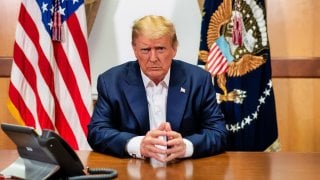The Meaning of 'America First' Foreign Policy
The America First platform should unapologetically make the case for America’s true interests and design US foreign policy to defend them in power. The United States of America exists to protect the natural rights and prosperity of the American people. It is not an institution of international security and it endangers itself by behaving like one.
The Trump administration’s greatest achievements were in foreign policy. Though manifested by presidential gut instinct, rather than bureaucratic mastery, ‘America First’ as practiced was the appropriate response to America’s shrinking margin for geopolitical error: open an exit from Afghanistan; avoid squandering resources and attention on new conflicts of the periphery; punish free-riding allies; focus on competition with China; and seek deals with America’s traditional adversaries. Donald Trump was the first president since Jimmy Carter not to ensnare the US in a new overseas conflict.
Some America First policies outlived Trump's first term. President Joe Biden went through with our overdue exit from Afghanistan. The focus on China remained. But, just six months on from the evacuation of Kabul, his administration energetically joined what has become a proxy war of attrition over Ukraine, reportedly ignoring diplomatic opportunities which could have shortened the conflict. It continues at unjustifiable cost to Ukrainians, the US treasury and arsenal, and prospects for strategic stability. Along with incoherent and destructive efforts to manage the crisis in the Levant, the White House has proven itself to be at the mercy of events and unable to prioritize. Administration officials insisted they could “walk and chew gum at the same time,” but all they really showed is that fiascos are easy if you are strategically blindfolded.
America First, Can It Last?
In the Republican Party, ‘America First’ became a matter of sloganeering. Every candidate in the primary field used the phrase to promote their foreign policy preferences. The failure of these challengers and President Trump's choice of JD Vance to be his running mate indicates there is a strong constituency for turning the page on the GOP's old interventionist foreign policy consensus.
Still, it remains uncertain whether the America First intuition of unilateral moderation can make the jump from mood to tradition. Some conservative analysts want to restore George W. Bush’s foreign policy, only this time with America First window dressing. But defaulting to the imperial definition of US interests propagated by the Democratic Party would court disaster: at the ballot box, it would fail to command the loyalty of the GOP base; internationally, it would overcommit America’s scarce resources to flashpoints in which she has little direct stake. The GOP needs an America First foreign policy platform, not just a slogan.
The foundation of that platform should be acceptance of tradeoffs: between home and abroad, and between competing international priorities. In this century the US is not powerful enough to keep the republic free and prosperous while simultaneously guaranteeing regional orders in Europe, the Middle East, and Asia. The America First platform recognizes that America is endangered by the risk of physical damage from conflict over distant questions, by fiscal and social damage done by the diversion of its blood and treasure to wars of choice, and by the mass violation of its borders by lawless migrant flows.
America First focuses scarce resources on international commitments sufficient to protect America and avoids risk-taking for luxury goals distantly related to the security needs of the American people. It is attentive to power balances in Europe and Asia, but rejects the de facto use-of-force heuristic of the foreign policy elite: reflexive defense of the global status quo. That approach will exhaust us and leave us in a weaker position to defend America when it really counts. Geographic remoteness and nuclear weapons afford us a huge degree of protection from breakdowns in Eurasia. We have the privilege to wait and see—and we should use it.
Foreign policy sufficiency begins in the Western Hemisphere. The Biden-era surge in illegal immigration has disrupted daily life across the country, increased our vulnerability to terrorist attack, and discredited legal pathways to residency. The administration has tended to treat this as a distraction, reacting only belatedly as the issue has threatened Vice President Harris's electoral prospects. America First defines the border as a core national security priority—one requiring new deterrent policies and completion of the wall.
America First emphasizes that the absence of geopolitical rivalry in the Americas is vital to US safety and international freedom of action. Geopolitical rivals now have greater resources to encroach on the Western Hemisphere, and America’s forward-leaning policies in post-Soviet Europe and the Indo-Pacific incentivize them to do so. The America First platform should restore the Monroe Doctrine as the irreducible red line of US security, taking it back to its dignified roots as a statement of defense and diplomacy, rather than as a license for military intervention. The doctrine is a shield, not a lance. In the century ahead we will need it to signal, bargain, and deter in defense of the republic.
Putting America First means ending our costly pursuit of luxury goals in the Middle East. America's shrinking margin for geopolitical error means that continuing deep engagement there directly trades off against more important priorities in Asia and conserving national resources for the turbulent century ahead. The US has three important, but not vital, Middle Eastern interests: ensuring that no local or external power dominates the region, stabilizing its energy flows, and preventing terrorist attacks on Americans. A small regional air and naval contingent linked to long-range strike capabilities is sufficient for these purposes. Our vulnerable ground deployments in Iraq and Syria should be withdrawn. The US has an interest blocking Iranian ambitions, but not to the point of a war with Tehran. It should rely on the capable network of partnerships solidified by the Abraham Accords to do the balancing. Successfully deprioritizing the Middle East will require flexibility to tilt as conditions require. Local partners like Israel and Saudi Arabia should remain partners, not become Article 5 allies. They should not have the presumption of reflexive American support. When they adopt policies that harm US interests, we should not be shy about imposing costs on them.
The Ukraine Factor
In Ukraine it is time for talks, not ideological wishcasting. The war is stalemated and will only end or pause through negotiations. The Biden administration policy of sending weapons without conditioning them on Ukrainian willingness to negotiate subordinates US interests to President Zelensky’s. The war’s continuation and expansion into Russia involves a persistent risk of nuclear escalation from which the American homeland is not immune. It has severely damaged prospects for a sustainable European settlement and deepened Europe’s dependence on the US in an era when our first-rank geopolitical challenges are in Asia. It has also strengthened the Sino-Russian partnership—the international combination with the greatest capacity to threaten US interests—into a more cohesive entente.
The US interest in having the war end and not restart greatly outweighs its interests in the eventual location of the Russia-Ukraine border or inflicting further costs on Russia. America First draws the prudent conclusion. Wielding its considerable military and economic leverage, the US should attempt to bring the combatants and key European states into sustained talks on a ceasefire and final status issues such as Ukraine’s geopolitical alignment and reconstruction. The relative weakness of US interests in the issues which sparked the war puts a premium on sufficiency in shaping US goals. An America First negotiating position should be willing to accept a deal along the lines of the March 2022 Istanbul Communique: Ukrainian neutrality, commitments against Ukraine’s membership in NATO, limits on Ukraine’s military relationship with the West, and a formula of multilateral security guarantees to Ukraine.
The war in Ukraine also obscures a decisive fact: the major problem of European security is now solved from the standpoint of vital US interests. Today, no country can hope to bid for European hegemony—not even Russia at its prewar strength. The European core commands nuclear weapons and has an economy six times the size of Russia’s. It is absurd for Americans to run the risk of a two-front war when one of the fronts can be handled by the Europeans. The US, facing intensifying security demands in Asia, should force Europe to take the reins. The America First platform should lay on the pressure for greater European security expenditure and convene talks on creating a Europeanized regional security architecture.
The way there runs through France, the only European state with the resources, confidence and ambition to organize and lead Europe as a third pole. The next GOP president should renew the old Franco-American partnership as a bridgehead for transitioning European security responsibilities from American to European leadership. The transition should be cooperative and phased, building towards an end state in which Europe can secure itself against all threats short of total great power war. To consolidate this process, the US should veto further NATO expansion. The nuclear umbrella and intelligence sharing should be kept in place for now, but the US should consider withdrawing from NATO’s unified command structure to encourage European autonomy. American foreign policy will be more disciplined, transatlantic ties more mature, and the international order more resilient if the major questions of European security are answered by the Europeans themselves.
The Asia Challenge
The rise of China is America’s most demanding grand strategic problem, but it is neither intractable, nor an emergency. Though a potent technological competitor and espionage threat, China is far from being able to politically subordinate or conquer Asia: it is surrounded by wealthy, confident, militarily capable states. The fact that nuclear weapons were invented at the high-water mark of American power in Asia imbues the status quo with a special tenacity. And the weight of the accumulation of China’s chronic economic problems will limit the resources it can devote to geopolitical prize-taking in the long run. All that said, China is and will remain a superpower. The America First sufficiency criterion therefore weighs against attempts to subvert its regime or restore US military primacy in Asia. Those goals are infeasible and pursuing them would risk severe tensions that endanger the American people.


